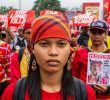“Impunity a serious issue that characterized extrajudicial killings and enforced disappearances in the Philippines” – Prof. Alston
Geneva, Switzerland—”It is very important, in my experience, to try to think strategically and to have a vision of how one really wants to look forward and I wouldn’t for the moment, downplay the importance of prosecution, which I have emphasized consistently and I wouldn’t de-emphasize the extent of the problem of impunity which sends a continuing signal to the military that they can do what they want.”
Thus did Professor Philip Alston, United Nations (UN) Special Rapporteur on extrajudicial, summary or arbitrary executions, state emphatically during a recent side event entitled, “The political killings and other human rights violations in the Philippines: Impunity and accountability at a crossroads between two administrations?” at the ongoing 14th Session of the United Nations Human Rights Council.
Alston was reacting to the call echoed by the Ecumenical Voice for Peace and Human Rights in the Philippines for the prosecution of President Gloria Macapagal- Arroyo for the extrajudicial killings that claimed the lives of 1,191 victims and all other violations of human rights during her nine years watch. Alston also said that impunity was the most serious issue that characterized the extrajudicial killings and enforced disappearances in the Philippines.
It will be recalled that Alston visited the Philippines in 2007. A year later, he submitted his formal report to the UN Human Rights Council. The Alston Report as it is known in the Philippines is a detailed narrative on the extradjudicial killings that peaked in 2005-2006 in the country. The Alston report cited the counter-insurgency program of the government and the failure to prosecute perpetrators as the main reasons behind the killings. The report also proposed some recommendations for the government to undertake. The government, however, maligned Professor Alston and ignored the report.
Alston also warned that the newly elected president is most likely to be advised by some other state actors to go slow on his campaign promise to prosecute the perpetrators of these killings and other human rights violations in the Philippines. “The President-elect will likely be reminded that he is heavily dependent on the Armed Forces of the Philippines, not to cause problems and that any prosecution will alienate the military,” Alston said. Turning to human rights defenders in the Philippines, Alston suggested that focus be given on the role of the judiciary and the human rights commission. He lauded the strong leadership of NGOs (non-government organizations), saying that among the countries he visited, the civil society in the Philippines was by far the most active in terms of providing him the data he needed.
During the side event, Marie Hilao-Enriquez, chairperson of Karapatan, said that the Oplan Bantay Laya counter-insurgency program being implemented by the Arroyo administration is the most vicious and brutal program unleashed by any Philippine president against the Filipino people as this is targeting civilians and civil society organization leaders and members rather than the armed rebels.
In the same vein, Rev. Rex Reyes, Jr., general secretary of the National Council of Churches in the Philippines (NCCP) and president of the Christian Conference of Asia (CCA), thanked Alston for the report which is constantly referred to in putting the government to task for its continuing violations of human rights. He also thanked the World Council of Churches, the Lutheran World Federation and the churches in North America for accompanying the Philippines in “bringing before the international community the brazen assault on human dignity in the Philippines”. Reyes reported that in view of the brazenness and impunity, some churches are seriously considering a class suit against the President when she steps down from office on June 30, 2010.
Alston, whose term as Special Rapporteur on extrajudicial, summary or arbitrary executions ends in July 2010, presented his final report to the UN HRC. In his remarks at the side event, he said he had “always retained great interest in the Philippines and will continue to be interested”.
Cecilia “Coco” Quisumbing, CHR (Commission on Human Rights) commissioner, who also attended the side event, bewailed the military’s and police’s non-cooperation with the commission during hearings or inquiries called by the latter. She also shared with the audience the promises that the presumptive president Noynoy Aquino declared when the commission interviewed him on his plans as incoming president.
The side event was co-sponsored by the Commission of Churches on International Affairs of the World Council of Churches (CCIA/ WCC), the United Methodist Church – General Board on Church and Society (UMC-GBCS), Christian Conference of Asia (CCA) and endorsed by the International Association of Democratic Lawyers (IADL).
Other members of the Philippine delegation are: lawyer Edre Olalia (acting secretary general, National Union of People’s Lawyers), Jigs Clamor (deputy secretary general, Karapatan and husband of Dr. Merry Clamor of the Morong 43), lawyer Carlos Zarate (Secretary General, Union of Peoples’ Lawyers in Mindanao).
References:
Rev.Fr. Rex Reyes, mobile number +639267048249
Marie Hilao-Enriquez, mobile number +639175616800
IMPORTANT NOTICE: INBOX is an archive of press releases, statements, announcements, letters to the editors, and manifestos sent to Davao Today for publication. Please email your materials to davaotoday@gmail.com. Davao Today is not responsible for the content of these materials. The opinion expessed in these items does not reflect those of Davao Today and its staff. Please refer to our terms of use/disclaimer.
Extrajudicial Killings









